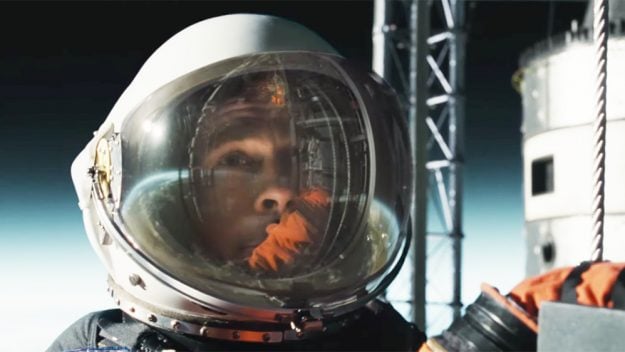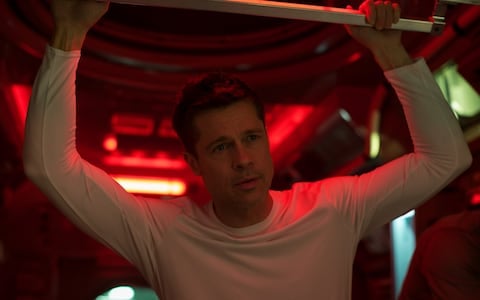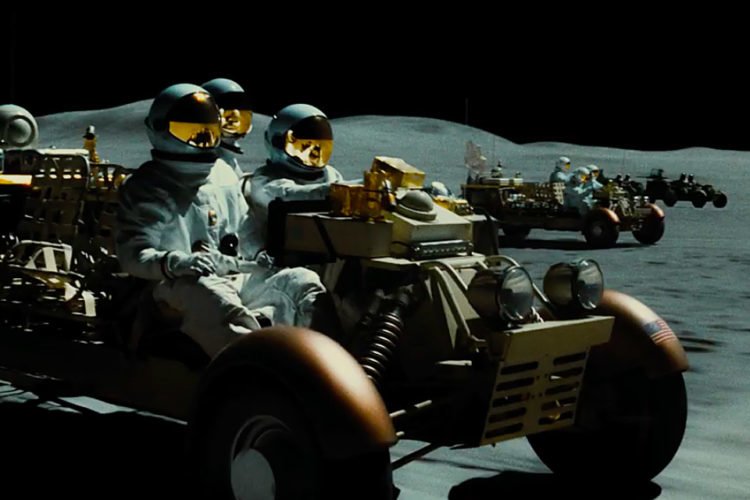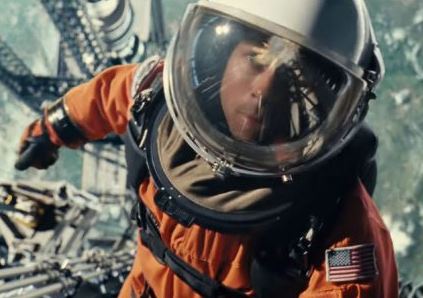
Before we go any further, let’s clear up the confusion around the name of this film: Ad Astra is Latin for “To The Stars.” Why they thought that was a good name is another discussion, but suffice to say, for a film set at least 100 years in the future where we travel into space, onto the moon, to Mars and then to the outer reaches of our solar system, “To The Stars” is entirely appropriate as a name.
But is it a good movie?
Certainly, from a visual perspective, it’s glorious. ‘Ad Astra’ has state-of-the-art visual effects, from the breathtaking opening scene on the space antenna to the various nationalist lunar colonies and thence to Mars and beyond, this is a film that begs to be seen and fully enjoyed on an IMAX screen.
 U.S. Army engineer and astronaut Roy McBride (Brad Pitt) is a hero of the space age, a man fabled for being so cool that even in moments of extreme danger his pulse never rises about 80 BPM. He’s also completely emotionally closed down. He could be a replicant or ‘bot from ‘Westworld’ and none of his colleagues would notice the difference. He’s also the son of famous astronaut Clifford McBride (Tommy Lee Jones), who broke all sorts of space records and blazed a bright trail through the stars. Clifford also led the ill-fated Lima Project, a mission to get beyond the solar system to continue the search for extraterrestrial intelligence. The project mysteriously went radio silent and for the last twenty years, Roy has been quietly mourning the loss of his tough, driven father.
U.S. Army engineer and astronaut Roy McBride (Brad Pitt) is a hero of the space age, a man fabled for being so cool that even in moments of extreme danger his pulse never rises about 80 BPM. He’s also completely emotionally closed down. He could be a replicant or ‘bot from ‘Westworld’ and none of his colleagues would notice the difference. He’s also the son of famous astronaut Clifford McBride (Tommy Lee Jones), who broke all sorts of space records and blazed a bright trail through the stars. Clifford also led the ill-fated Lima Project, a mission to get beyond the solar system to continue the search for extraterrestrial intelligence. The project mysteriously went radio silent and for the last twenty years, Roy has been quietly mourning the loss of his tough, driven father.
A massive electrical pulse floods the Earth, wreaking havoc and killing thousands. A solar flare? Nope, it turns out that it’s an energy pulse that seems to have originated in the furthest reaches of our solar system: From the direction that the Lima Project vessel was traveling before radio communication was lost. Roy’s mission: Get to Mars and reach out to his father via secret narrow burst transmission to find out what’s going on. This obviously brings up all sorts of long-submerged emotions for Roy, all revolving around that archetypal theme of his relationship with his father. If Dad’s alive, that is.
Meanwhile, the space agency has its own agenda for the mission and creating a warm and fuzzy family reunion in space is far from its goal, which eventually pushes the usually quite compliant Roy to go against mission control for the first time in his career.
 Humans have long since established colonies on the moon and Mars, and there are even mining colonies on the asteroids. The film takes us on a journey from Earth to the lunar colonies then to Mars and off towards Neptune. Far from pristine, the moon is a chaotic swirl of national outposts and mining claims, complete with lunar pirates who claim various regions as their own. To get to the Martian bound rocket, Roy must travel through these lawless lunar areas, in one of the most exciting sequences in the film. Think Mad Max in Space and you’ll have a sense of how the sequence plays out. Darn cool, really!
Humans have long since established colonies on the moon and Mars, and there are even mining colonies on the asteroids. The film takes us on a journey from Earth to the lunar colonies then to Mars and off towards Neptune. Far from pristine, the moon is a chaotic swirl of national outposts and mining claims, complete with lunar pirates who claim various regions as their own. To get to the Martian bound rocket, Roy must travel through these lawless lunar areas, in one of the most exciting sequences in the film. Think Mad Max in Space and you’ll have a sense of how the sequence plays out. Darn cool, really!
Director James Gray and cinematographer Hoyte Van Hoytema borrow a lot of the visual style of the film from two of my favorite science fiction films, ‘2001: A Space Odyssey’ and ‘Blade Runner 2049‘. It’s fantastic. The pacing of scenes, the attention to details with background elements, the intense use of light and colors, there’s a lot that serves as homage to two great movies. Honestly, Ad Astra is worth seeing just for the visuals.
 Which is good, because the story itself is disappointingly shallow for such a big, expensive production. ‘2001’ considers the evolution of mankind and the nature of God. ‘Blade Runner’ explores what it means to be human and our relationship with our technology. ‘Ad Astra’? A boy and his Dad, and not even a very satisfying emotional and psychological journey at that. It’s no spoiler that Roy’s father Clifford turns out to be alive and when they first see each other after 20 years it’s comically anticlimactic. As a father and a son, I kept expecting deeper and more profound story but the film just doesn’t deliver.
Which is good, because the story itself is disappointingly shallow for such a big, expensive production. ‘2001’ considers the evolution of mankind and the nature of God. ‘Blade Runner’ explores what it means to be human and our relationship with our technology. ‘Ad Astra’? A boy and his Dad, and not even a very satisfying emotional and psychological journey at that. It’s no spoiler that Roy’s father Clifford turns out to be alive and when they first see each other after 20 years it’s comically anticlimactic. As a father and a son, I kept expecting deeper and more profound story but the film just doesn’t deliver.
I wanted to love ‘Ad Astra.’ Every single scene on the big IMAX screen was gorgeous and the production was absolutely top notch. Pitt delivers a very good performance and the secondary characters like Martian base leader Helen Lantos (Ruth Negga) and Colonel Pruitt (Donald Sutherland) are solid. As the long-isolated father, however, Tommy Lee Jones barely emotes. In a role that required deep acting and ragged emotions, he doesn’t deliver. But it’s not Jones but the story that will leave you wanting more. Still, I suggest it’s worth watching regardless, if just for this compelling and fascinating vision of the future.
![]()
